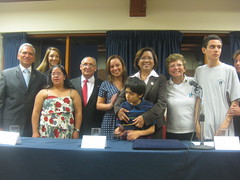On
Wednesday, 25 April 2012, the Centro Ann Sullivan del Perú (CASP) and the
Government of Panama signed an agreement of Professional Consulting and
Training Program to transfer the comprehensive education system that CASP has
successfully developed to this Central American country.
Thanks to
the initiative of Mrs. Marta Linares de Martinelli, First Lady of Panama, who took
all necessary steps to create an Ann Sullivan center in her country so that
children with autism and their families can receive a quality education and
become independent, productive and happy people, this agreement was made
possible.
The signing of this agreement took place at the main
building of the Centro Ann Sullivan of the Perú (CASP) and was in charge of Dr. Liliana Mayo,
founder and general director of the Centro Ann Sullivan of the Perú (CASP) and ,
representing the National Government of the Republic of Panama, Dr. Ariadna de Petterson, representative
of the Minister of Education (MEDUCA, in Spanish); Mr. Ramón Alemán, director
of National Secretariat for Disabilities (SENADIS); Miss. Karinthia Carrillo,
representative of the First Lady’s Office; and the Panama ambassador to Peru,
Dr. Carlos Luis Linares.
This agreement is part of a commitment of the
National Government of the Republic of Panama to serve people with different
abilities (autism, mental retardation, Down syndrome, cerebral palsy).
It is considered in the first phase of this
agreement to set an education system for people with different abilities and
their families in motion in this Central American country.
Since the founding of CASP, a great number of
conferences showing the impact of a Peruvian program in the lives of people
with different abilities have been held in diverse countries. CASP is
internationally recognized for its contributions as research, demostration and
training model center for people with different abilities and their families,
Currently in Peru, 100 students are working in 34 companies and other 100 are
studying in 53 regular education schools, thanks to the centre’s training and
guidance.
It is an honor that the Government of Panama has
chosen the CASP’s education model to be implemented in its country.

